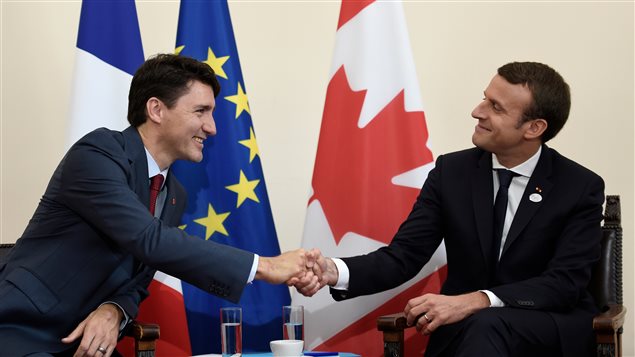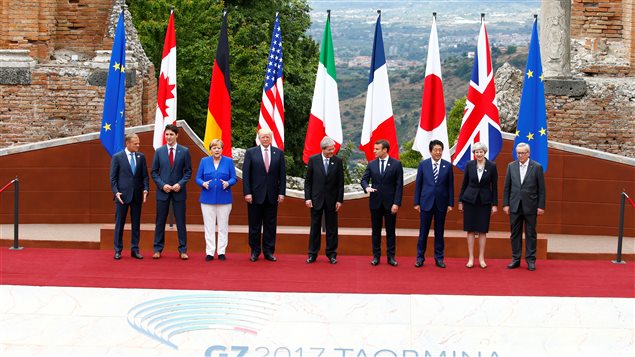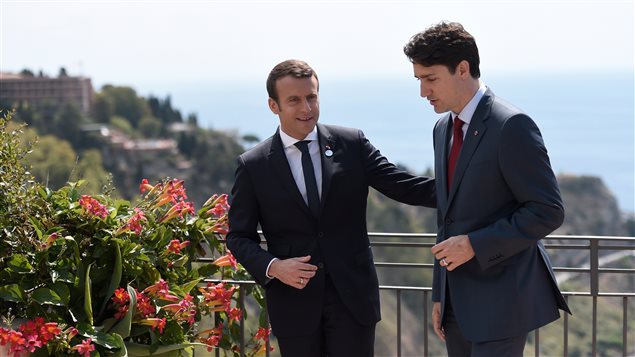When G20 leaders meet in Hamburg next week many observers will be watching the budding bromance between France’s newly elected President Emmanuel Macron and Canadian Prime Minister Justin Trudeau.
The G20’s two youngest leaders – Macron is 39, Trudeau 45 – have a lot in common. Both come from privileged backgrounds but share a left-leaning centrist ideology. Both were underestimated by their opponents because of their youth and both have proved that their adversaries do so at their own peril.
And then there is the common bond of the French language and culture. But there is more to the fledgling friendship that started at the G7 summit in Taormina, Sicily.
Interpreting Trump

Macron and Trudeau need each other for various political reasons, not least because of the volatile and unpredictable man who has come to occupy the White House, said Ferry de Kerckhove, a former Canadian diplomat who’s advised several prime ministers.
“Important in the emerging relationship are not just the foundations – the Atlantic Alliance, the Comprehensive Economic and Trade Agreement (CETA), our common perspective on multilateralism – but, in the short and medium term, the fact that both leaders need one another to face the American president,” de Kerckhove told dpa. “One might even say to interpret together what the latest presidential tweet portends.”
Canada has a unique opportunity to be a bridge between Europe and the United States, said Joe Clark, a former Canadian prime minister and foreign affairs minister.
“There was a time when relations were unusually undeveloped between the United States and Europe, when NATO was first being formed, that Canada really was the Atlantic link,” Clark said, speaking to reporters on the sidelines of the recent International Economic Forum of the Americas in Montreal.
Part of Canada’s role then was to ensure that there were “no grievous misunderstandings” between the U.S. and its new European allies.
Trudeau, who has managed to get along with President Donald Trump very well despite their ideological and policy differences, and festering trade disputes, might have to play that role once again.
Strategic backup

In return, Trudeau may need to rely on France and Europe to provide Canada with some strategic depth or independence from the U.S., de Kerckhove said.
Just like German Chancellor Angela Merkel, who spoke of intractable differences between the U.S. led by Trump and Europe, Canada has been forced to conduct “an agonizing reappraisal” of its relationship with its largest trade and security partner, de Kerckhove said.
The Trump administration’s rejection of the Paris climate accord seems to have been one of the decisive factors in the Trudeau government’s decision to stake out a more independent foreign policy stance that is much more in line with the views of many Canadians critical of Trump’s policies on the environment, multilateralism and trade, de Kerckhove said.
“Our prime minister’s ‘European diplomacy’ – Italy, Germany, France, Belgium, etc. – has been quite remarkable: we need CETA ratified, and President Macron, as a committed Europeanist, is a key ally in the process,” de Kerckhove said.
Opportunities for cooperation
The two countries also cooperate in La Francophonie, the organization of French-speaking states, which is now chaired by former Canadian Governor General Michaelle Jean.
“Of course, there is a total unity of purpose when it comes to climate change on which France and Canada are essential partners,” de Kerckhove said.
Another critical but rather surprising point where Canadians have joined the French is on defence, he said.
Trump’s message to NATO has clearly had an impact on his allies, de Kerckhove said.
“Pretty much for the same reasons as Angela Merkel argued that Europe needs to rely on its own capabilities to ensure peace and stability, Canada has courageously stated that it could no longer rely on the U.S. for its defence and must follow words with deeds,” de Kerckhove said. “This hugely redefines the traditional Liberal stance on defence. In that vein, our co-operation with France in Africa will be highly worthwhile.”
There is also strong cooperation with Europe and France on the issue of combatting terrorism. Canada and France also cooperate fully in the fight against the so-called Islamic State in Iraq and Syria, de Kerckhove said.
Many people forget that France is a Pacific nation through its territories in French Polynesia and New Caledonia, and there is a big potential for cooperation between Paris and Ottawa in the Pacific.
“France, for its part, is very interested in the Arctic and therein lies another area of potential co-operation,” de Kerckhove said.
“Overall, on substance and mutual feelings of compatibility, these two younger men definitely have it.”








For reasons beyond our control, and for an undetermined period of time, our comment section is now closed. However, our social networks remain open to your contributions.